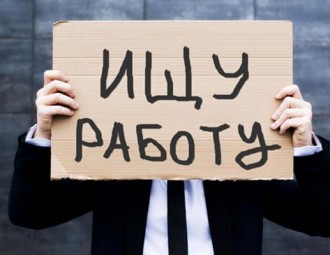Uladzimir Kavalkin: Statistics on unemployment and real unemployment are poles apart in Belarus

Officially, the unemployment in our country is reducing – if judging by the number of registrations at the labor exchange; however, the number of jobs doesn’t increase in the economy.
Thus, according to official statistics, the number of the unemployed decreases in our country – for the three months in a row the number of registered at the labor exchange has been falling. So, in July, the official unemployment has decreased by 2.5 thousand in total, according to the Ministry of Labor and Social Security; whereas as of August 1, there were 44.9 thousand unemployed (which makes 1% of the economically active population). As of May 1, 2016 the labor exchange counted 53.8 thousand unemployed, while a year ago 46.6 thousand people have been registered, which means that over the crisis year the number of the unemployed decreased by 3.7%.
Speaking about yet another Belarusian economic paradox in the interview with the “EuroBelarus” Information Service, Uladzimir Kavalkin, an expert on the problem of state service reform and the head of the “Cost of government” project within the BIPART project stresses that when analyzing the labor market, “it’s extremely hard to rely on the official statistics on unemployment.” "Given that only the very small proportion of the working population enrolls on the labor exchange, even minor factors can greatly distort the statistics," - Uladzimir Kavalkin said.
According to the expert, the increased registration at the labor exchange is primarily connected with the Decree "On prevention of social dependency", better known as the "decree on freeloaders." "It was easier to go to the labor exchange and get the legal right not to pay the so-called" tax on freeloaders”, which makes a little over two hundred dollars, - Uladzimir Kavalkin said. - People just tried to avoid paying this fee."
“It’s much more important to look at the dynamics of the reduction of number of jobs in the Belarusian economy, - Uladzimir Kavalkin notes. – And this dynamics is very worrying: the economy has lost 153 thousand jobs from January 1, 2015 until May 1, 2016. This decline can indeed demonstrate that the demand for labor falls, which leads to an increase in real unemployment."
The role of the state in helping the unemployed is so little, that the labor market becomes the last place where the unemployed would go, the expert believes. "Firstly, the unemployment benefit is one of the lowest among the CI: in June the allowance amounted to slightly more than $13 a month, which is too little to survive. In addition, those who are registered at the labor exchange are sometimes forced to do public works in construction, cleaning, gathering in the harvest on at collective farms. It is clear that it is better to be employed as a janitor and get low salary that to get such allowance. Another well-known factor is that it’s impossible for a qualified employee to find a decent job through the official labor exchange. These are the factors that lead to a positive official statistics on unemployment,"- Uladzimir Kavalkin said.
However, it is possible that in the near future the popularity of the labor exchanges will greatly increase. The International Monetary Fund and the Eurasian Development Bank, the main creditors of Belarus are constantly talking about the need to increase the unemployment benefit. The Belarusian government does not exclude that the benefit may even reach the cost of living, which now makes about $89 a month. But the right to such an allowance will only be available to those who have lost their jobs because of the company's liquidation.
According to the Belarusian experts, the real unemployment rate in Belarus is not less than 5% of the economically active population.
-
03.01
-
07.10
-
22.09
-
17.08
-
12.08
-
30.09










































